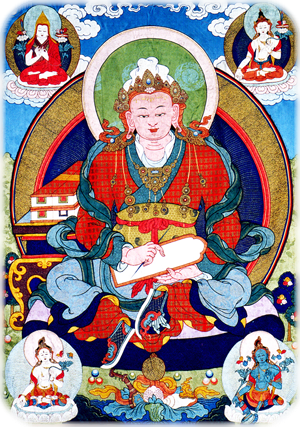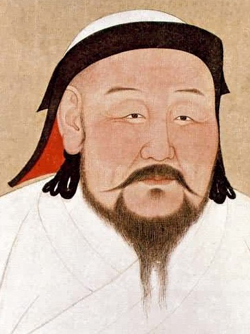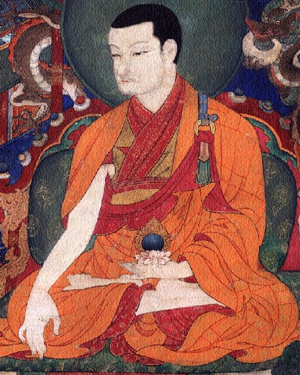A Gift of Dharma to Kublai Khan
(As spoken by the Sakya-pa Chögyal Phagpa)

To the incomparable Enlightened One, who is endowed with the splendour of fame in name and the splendour of wondrous virtues in actual fact, I offer homage.
Although you, mighty emperor, know already the discourses on worldly and spiritual science, still, as with the songs and music of musicians to which you listen again and again even when you have heard them all before, why shouldn't a poet repeat wise words?
All of the countless teachings of Dharma taught by the Sage for the sake of countless disciples indeed are meant to be practised. But how may this be done?
Just as a man bound by fear and shame would not disobey his king's command but dwell in right conduct without harming others and, as a result, would ever grow in good fortune and even earn the praises of his king, so, too, with a person who accepts, in accordance with his ability to accomplish them, the rules of discipline enjoined by the Sage to help beginners on the Hinayana and Mahayana paths: if, after properly receiving vows from an abbot, that person would then guard them because he is bound both by fear of seen and unseen sufferings in worldly existence and by shame whenever he reflects, 'The multitudes of Noble Ones who know the thoughts of other beings will be shamed if I break my vows, . . .'
He, as a result, would become a foundation not only of seen and unseen joys in worldly existence, but of the virtues of perfect liberation; he would also become a worthy object of veneration for men and gods and even receive the praises of Buddhas.
These three realms of existence, after all, are just suffering, while Nirvana, too, is just peace. Looking with pity, therefore, on those who wish either for worldly existence or Nirvana, it is the Buddha alone who, Himself free from sorrow, removes sorrow, and who, having Himself attained great Joy, bestows joy. And He has appeared from amongst beings like ourselves.
 The methods He used we can also use. Without timidity and laziness, therefore, you should unwaveringly aspire to win highest enlightenment and feel free to think, “I must surely attain Buddhahood”. Guard as your own life the vows you have made which, if violated, will cause you to be burnt in hells and which, if preserved, will enable you to experience truly wonderful results in proceeding from Joy to Joy even now. The methods He used we can also use. Without timidity and laziness, therefore, you should unwaveringly aspire to win highest enlightenment and feel free to think, “I must surely attain Buddhahood”. Guard as your own life the vows you have made which, if violated, will cause you to be burnt in hells and which, if preserved, will enable you to experience truly wonderful results in proceeding from Joy to Joy even now.
Since the three sets of vows - of the Hinayana, Mahayana and Vajrayana paths - are the foundation whereon all virtues may arise, remain and grow within oneself and others, try from the very first to be firm in their observance.
Become certain that the Teaching, which is virtuous in its beginning, middle and end, and whose words are quite flawless and not contradictory to the two logical proofs of valid knowledge, is the unique spiritual way among ways.
Know, too, that the Enlightened One who taught it is endowed with unhindered wisdom and great compassion - since He revealed (the truth) without close-fistedness - and also with tremendous power.
Because they are His followers and a gathering of beings with virtues similar to His, because also your own sphere of spiritual activity is identical to theirs, know the noble Assembly of Bodhisattvas to be the best field for increasing your merit.
Realising that it is your preceptor who points out and introduces you to these Three Jewels, that he is endowed with the same virtues they have, and that he sustains you with kindliness, always attend and meditate upon him with unflagging faith.
Since they are like yourself in having the nature of being endowed with the causes of pain and with a constant state of unsatisfactoriness, and like yourself, moreover, in wishing themselves to be free from unhappiness and its causes, you should unceasingly meditate great compassion for all living beings.
Recalling the benefits of virtue, which you will need in order to attain highest enlightenment and to achieve others' good as well as your own purposes, strive wholeheartedly with genuine devotion to acquire it. In brief, since a mind endowed with faith, compassion and devotion is the precursor of all spiritual accomplishments, perform every least virtue with these three present.
Envision the Body of the Enlightened One either in front of you or as your own body, and visualise that your dwelling place is a Buddhafield wherein all beings are Conquerors surrounded by Bodhisattvas and Disciples. Then worship yourself and others with oceans of offerings consisting of the enjoyment of the five sense-objects.
Realise that your own virtuous preceptor and all the Conquerors are truly equal and nondual in form, activity and essential nature. At all times, you should envision him in front of you, or seated atop the crown of your head, or within the lotus of your heart, and pray to him or meditate upon him as being nondual with yourself.
Of virtue, nonvirtue, pleasure, pain and all the phenomena of Samsara and Nirvana, mind is the substratum.
If you were to examine that mind thoroughly from every angle, you would realise that it has neither colour nor shape, nor is it single or manifold. It therefore has no nature; therefore it is not arisen, neither does it remain nor cease. It is devoid of both centre and periphery, and is thus away from all extremes. It has just the nature of space.
Even so, cognition is not stopped. Hence mind has the nature of nondual cognition-and-emptiness.
As one's own mind is, so, too, is the nature of all beings' minds. Understand thoroughly that all phenomena are nondual appearance-and-emptiness and place your mind in meditation without grasping.
Through meditating nondually on the two objects (one's preceptor and the Enlightened One) and objectlessness (emptiness), you will attain a superior meditative state of tranquil concentration (shamatha) that cannot be disturbed by thoughts.
Joyfully remembering that every act of virtue or nonvirtue increases the strength of one's virtuous or nonvirtuous inclinations, always bring virtues to mind and strengthen them.
Especially should you recollect and analyse the support, form and experience of your meditation whenever you have meditated upon an object. Through examining further the interdependent origination of their causes and conditions - however many they may be - you will attain meditative insight (vidarshana) through realising the true state of their suchness, i.e., that no support, form or experience whatsoever exists.
Following the performance of virtues, you should gather together in one all the merit acquired through that (meditation and the like), and fully dedicate them to the attainment of perfect enlightenment by yourself and all these countless beings.
Even though transferrable merit may not have been acquired at the time you offer prayers, your wishes nonetheless will be fulfilled if you pray for a great purpose to be achieved - for mind alone is chief. Every virtue which is adorned by this kind of recollection, dedication and noble prayer will increase unceasingly and eventually become the cause of great good for oneself and others.
Everything that is experienced and all other conditioned things (samskrtadharma) i.e., the five aggregates, the senses, sense-objects and sense consciousnesses) are devoid of any nature of their own because they all depend upon causes and conditions.
You should know, therefore, that these external objects also, which appear in various forms to, and are experienced by, mind that is stained by mental impressions, are not real; they are like magical shows which appear due to a variety of causes they are also like dreams that occur during sleep.
 The (so-called) 'unconditioned dharmas' (asamskrtadharma) are simply ascriptions. A person would have to be mad to wish to propose meaningless names for them, or to indulge in thoughts about them and thereby accept them as 'conditioned dharmas'. The (so-called) 'unconditioned dharmas' (asamskrtadharma) are simply ascriptions. A person would have to be mad to wish to propose meaningless names for them, or to indulge in thoughts about them and thereby accept them as 'conditioned dharmas'.
Never scorn the connection between deeds and their results, for (the teachings on) the interdependent origination of cause-and-result as it operates in the sphere of relative truth are not deceptive. You will experience the ripening results of your actions.
There are 'eternalists' in whose view the substantiality of phenomena is accepted. However, no object whatsoever exists which is devoid of (both) direction (i.e., dimension) and time (i.e., consciousness): if you were to analyse the forms of direction and space, you could not possibly find a single entity (which is not reducible to its component parts). And if a 'single entity' does not exist, whence could 'many' appear? As there is no existence other than these, the conceptualisation of 'existence' (itself) is an inferior one.
Just as there is no length without shortness, how could a nature of 'nonexistence' be apprehended when even a nature of 'existence' is not obtained?
Know, intelligent one, that the Real also does not consist of 'both' (existence and nonexistence) because this possibility has been removed by the rejection (of each individually); nor does it consist of being 'neither' of the two, because there is no logical proof for this possibility and, in any case, there is no possible 'bothness' to which it could be an alternative.
But if we were to conclude that 'Mind alone is real since it is formless and thus has no directions', (we would have to admit that) it also becomes plural and false if subject and object are identical, (the latter being manifold).
If, however, subject and object are different to one another, how then do objects become objectified and mind subjectified. If the two arise dually, in what way (e.g, simultaneously or otherwise), do they appear? Finally, what kind of liberation is achieved merely by rejecting illusory external appearances?
Since the object is not established as real by nature, the subject, too, is not established as real. The claim that there exists somehow a pure consciousness apart from these two, is as extremely wrong as the (Sankhya philosophers' notion of a) 'Self' (purusha) distinct from the transformations of primal nature (prakrter vikara).
Be free from supports, knowing that all phenomena from the first, are unarisen, natureless, away from extremes and like space.
Marvellous and much more wondrous than any wonder is this knowledge which does not relinquish the emptiness of all dharmas nor yet stop the process of interdependent origination!
Realise that objects are the nonduality of appearance-and-emptiness, that mind is the nonduality of knowledge-and-emptiness, and that the paths to liberation are the nonduality of methods and wisdom. Finally, act (in accord with this insight).
The stages of cause, path and result should be understood thus: the interdependent origination of the relative sphere is like illusion; in the ultimate, the nature of dharmas is emptiness; finally, both are nondual without differentiation.
Thus, if the foundation (morality), preparation (reflection), meditation, conclusion (dedication of merit and recollection) and the process of practice taken as a whole each be multiplied by three (in correspondence to the three stages of cause, path and result), all the paths of virtue are gathered together in fifteen factors.
Whoever strives to perfect these (fifteen) factors in each performance of virtue enjoys the happiness of fortunate states and accumulates oceans of the Two Collections (merit and transcendent wisdom).
Through the clarity of his meditation, he becomes joined with the Aryan Path and increases in transcendent wisdom as a result of his meditation and noble conduct. Then, attaining the goal (of Buddhahood) through coursing along the final stages of the Path, he puts an end to all thought constructions by realising the nature of mind to be pure from the very beginning. (His mind) becomes one flavour with the Dharmadhatu and is transformed into the Svabhavikakaya which is the transcendent wisdom of Dharmadhatu and the knowledge of the perfection of renunciation.
For him, the dharmas of worldly existence become transformed through the practice of the path so that his body becomes the Body (of an Enlightened One) adorned by (112) marks and signs of perfection His voice becomes (the Voice of the Buddha) endowed with sixty tones; his mind is transformed into Transcendent Wisdom and is also endowed with omniscience. Passions are transformed into the boundless virtues of the Conqueror and constitute the Sambhogakaya. His deeds are transformed into the 'Task-Accomplishing Wisdom' and the countless kinds of enlightened activity that form the Nirmanakaya.
These five wisdoms constitute the perfect realisation of the Enlightened One and, inasmuch as He is also endowed with spiritual power, they are unending and uninterrupted. May you also, O emperor, become like Him!
Through the merit of offering this gift of Dharma, which summarises the deep sense of the noble path, may all living beings with you, O king, as their chief, quickly attain the highest stage of enlightenment.
My own mind, too, has become encouraged by composing these lines as a gift of doctrine and so I shall speak further of another matter: undistractedly hear it, O Lord among Beings!
The time when you should make efforts is now: make firm the good fortune you have, ensure long life and the success of your lineage and practise right methods to gain liberation.
It is right to make efforts without distraction. At a time when Dharma has not yet set like a sun and a religious king like yourself sits on the throne, how can your mind remain indifferent to the plight of those who wear saffron robes?
Though I am not old, the strength of my body is slight and my mind inclines to be lazy; therefore I wish to be excused for awhile that I may seek Dharma's meaning in solitude.
From “Treasures of the Sakya Lineage” by Khenpo Migmar Tseten Translated by Acharya Lobsang Jamspal and Acharya Manjusiddhartha [Jared Rhoton]. Copyright, Victoria Buddhist Dharma Society, 1976 |

